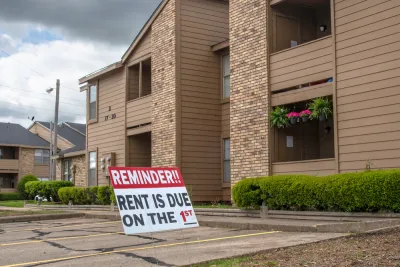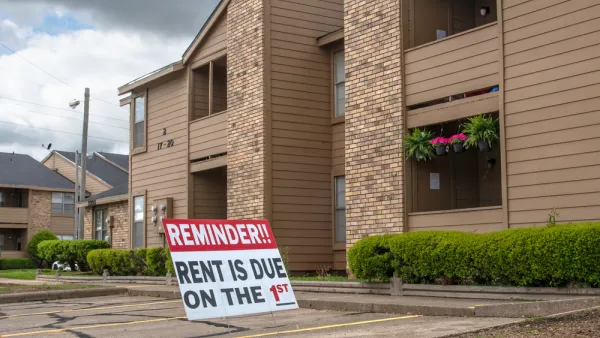Advocates have sounded alarms since the pandemic's outset about the potential for unprecedented waves of evictions as Americans deal with the economic consequences of the pandemic, but authoritative real-time data on the rental market is lacking.

Jenny Schuetz provides insight on how to scientifically and accurately predict the economic risk facing the U.S. rental market as the pandemic surpasses the seven month mark. Many households are "running on fumes," according to Schuetz, but one looming crisis, the threat of millions of evictions, has stayed in the background. Questions like "How many renters are in financial trouble?" and "How many will face eviction when current protections end?" are hard to answer, however, because there isn't a lot of real-time data for provide insight.
Policymakers and the public receive high-frequency updates on labor markets, including weekly unemployment insurance claims and monthly jobs numbers. But federal statistical agencies don’t publish real-time data on housing distress, especially for renters.
One resource of tremendous value during this time, according to Schuetz, has been the Household Pulse Survey, launched this year by the U.S. Census Bureau. New research is helping shed light on the usefulness of the data collected by the Household Pulse Survey.
"A new paper from Jeff Larrimore and Erin Troland sheds light on how responses from the Household Pulse Survey can be used to forecast how many households will miss rent payments—and a caution on how not to use the data," explains Schuetz. The key finding: comparing responses over time yields more accurate probabilities for rent payments.
Schuetz provides a lot more detail about the study's methodology, also comparing a few other studies that also attempt to wring actionable data from the survey, in an effort to gain a stronger understanding of the risk facing the U.S. rental market.
FULL STORY: How many households can’t pay next month’s rent? That’s a tricky question.

Analysis: Cybertruck Fatality Rate Far Exceeds That of Ford Pinto
The Tesla Cybertruck was recalled seven times last year.

National Parks Layoffs Will Cause Communities to Lose Billions
Thousands of essential park workers were laid off this week, just before the busy spring break season.

Retro-silient?: America’s First “Eco-burb,” The Woodlands Turns 50
A master-planned community north of Houston offers lessons on green infrastructure and resilient design, but falls short of its founder’s lofty affordability and walkability goals.

Test News Post 1
This is a summary

Analysis: Cybertruck Fatality Rate Far Exceeds That of Ford Pinto
The Tesla Cybertruck was recalled seven times last year.

Test News Headline 46
Test for the image on the front page.
Urban Design for Planners 1: Software Tools
This six-course series explores essential urban design concepts using open source software and equips planners with the tools they need to participate fully in the urban design process.
Planning for Universal Design
Learn the tools for implementing Universal Design in planning regulations.
EMC Planning Group, Inc.
Planetizen
Planetizen
Mpact (formerly Rail~Volution)
Great Falls Development Authority, Inc.
HUDs Office of Policy Development and Research
NYU Wagner Graduate School of Public Service



























